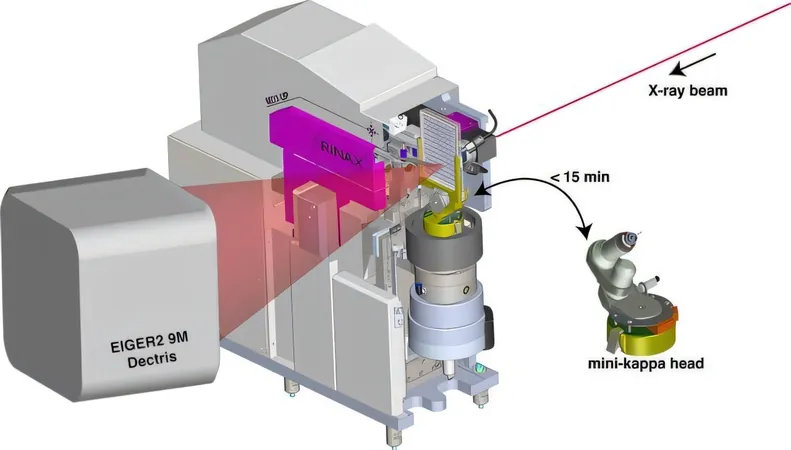
Shocking Discovery Uncovers How Meth and PCP Inflict Long-Term Cognitive Damage!
2024-09-26
Author: Nur
Introduction
Recent research has revealed startling insights into how long-term abuse of drugs like methamphetamine and phencyclidine (commonly known as PCP or "angel dust") leads to significant and lasting cognitive impairments. Neurobiologists from the University of California San Diego have pinpointed a specific brain mechanism responsible for these adverse effects, shedding light on the complexities of drug addiction and recovery.
Research Background
The study, conducted by a team in the Department of Neurobiology under the guidance of Professor Nicholas Spitzer, explored how these two drugs, which engage different targets in the brain, produce similar cognitive deficits. How could drugs that operate in such diverse ways cause the same memory issues? This intriguing question prompted extensive research.
Key Findings
Published in the prestigious journal *Nature Communications*, the findings illustrated a phenomenon called "neurotransmitter switching." This mechanism involves a shift in how neurons communicate, demonstrating that brain plasticity is not only a response to learning but also a consequence of drug exposure. This research is particularly significant as it aligns with previous investigations that correlated neurotransmitter switching with conditions like autism spectrum disorder and post-traumatic stress disorder, as well as the cognitive benefits associated with exercise.
Experimental Methodology
In a controlled environment, the researchers examined the cerebral cortex of mice and found that both meth and PCP prompted a transition from the excitatory neurotransmitter glutamate to the inhibitory neurotransmitter GABA (gamma-aminobutyric acid) in the same neurons located in the prelimbic area—integral to executive functions like decision-making and impulse control. This neurotransmitter switch was detrimental to memory performance; however, when the expression of GABA was inhibited, the drug-treated mice regained their cognitive capabilities.
Future Directions
In groundbreaking follow-up experiments, the team discovered that they could reverse the neurotransmitter switch, even after the mice had been repeatedly exposed to the drugs. Utilizing molecular tools to decrease brain electrical activity or administering clozapine, a medication traditionally used to treat schizophrenia, effectively restored cognitive functions in the affected mice.
Implications
Assistant Project Scientist Marta Pratelli remarked, “These results suggest that targeted manipulation of neuronal activity could be a game-changer in alleviating some of the harmful consequences of chronic drug use.” Interestingly, researchers also identified that an increase in dopamine release—the brain's primary neurotransmitter linked with reward and pleasure—alongside heightened electrical activity in the cerebral cortex, was essential for triggering neurotransmitter switching during drug exposure.
Conclusion
"This study reveals a shared and reversible mechanism responsible for the cognitive deficits seen with different types of drugs," noted Spitzer, emphasizing the potential for this knowledge to pave the way for new therapeutic strategies targeting drug-related cognitive impairments. As we gain a deeper understanding of the mechanisms behind memory loss due to substances like meth and PCP, the implications could extend beyond these specific drugs to offer insights into treatment options for a wider range of psychiatric disorders, potentially enhancing recovery for countless individuals.
Future Research
With ongoing research and support from institutions like the National Institute on Drug Abuse and the Overland Foundation, experts remain hopeful that strategies derived from these findings might transform approaches to treating drug addiction and cognitive dysfunctions in the near future. Stay tuned for more updates as this exciting area of study progresses!



 Brasil (PT)
Brasil (PT)
 Canada (EN)
Canada (EN)
 Chile (ES)
Chile (ES)
 España (ES)
España (ES)
 France (FR)
France (FR)
 Hong Kong (EN)
Hong Kong (EN)
 Italia (IT)
Italia (IT)
 日本 (JA)
日本 (JA)
 Magyarország (HU)
Magyarország (HU)
 Norge (NO)
Norge (NO)
 Polska (PL)
Polska (PL)
 Schweiz (DE)
Schweiz (DE)
 Singapore (EN)
Singapore (EN)
 Sverige (SV)
Sverige (SV)
 Suomi (FI)
Suomi (FI)
 Türkiye (TR)
Türkiye (TR)